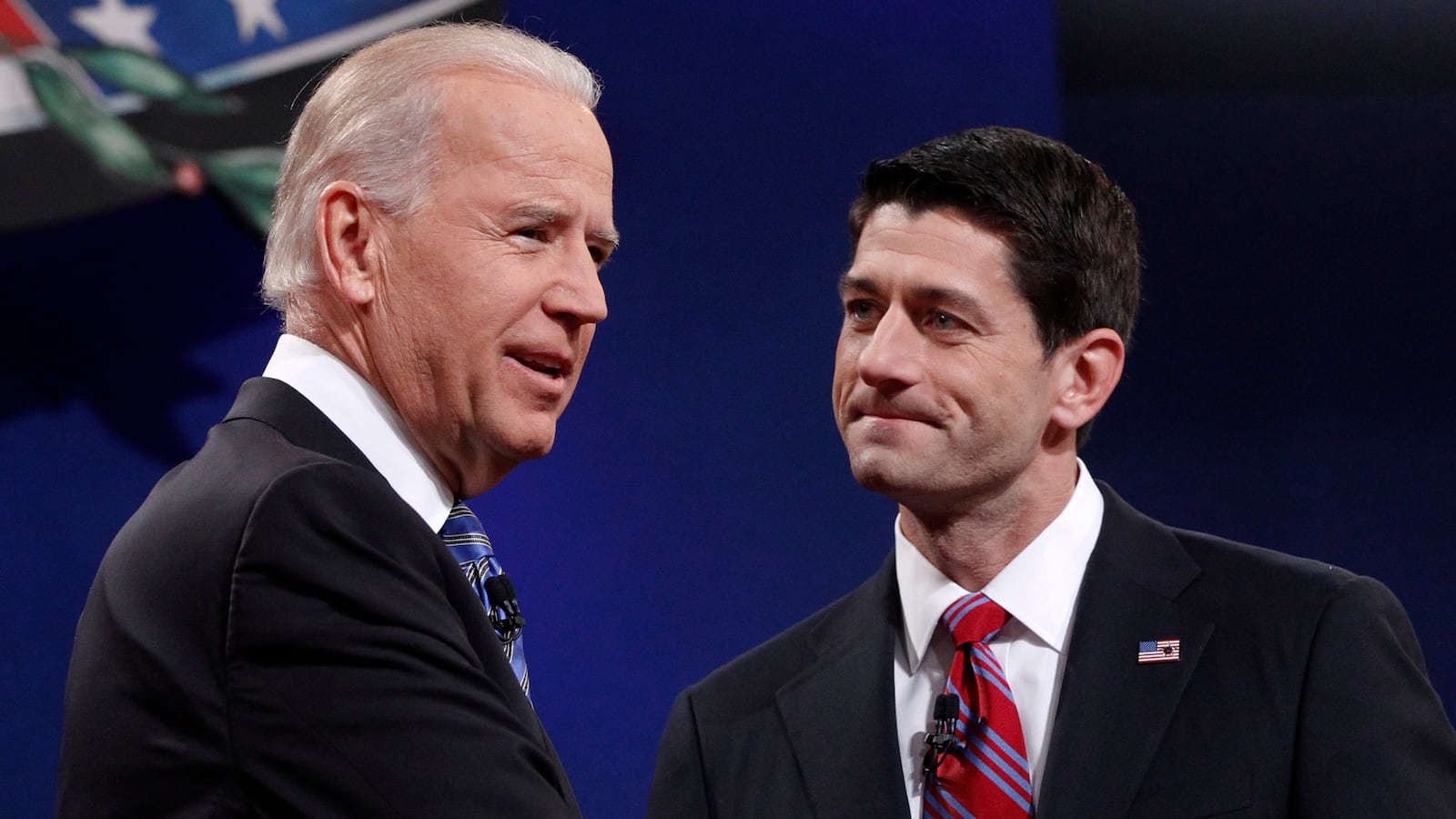For a major-party nominee, the selection of a running mate is the first “presidential” decision. Some choices have worked out well. In 1992, when Bill Clinton selected a fellow Southerner, Sen. Al Gore of Tennessee, to create the “Double Bubba” ticket, he energized a new generation in the Democratic Party. Other VP picks have backfired. Witness Alaska governor Sarah Palin in 2008. She all but doomed nominee John McCain’s chances as soon as she proved unwilling—or unable—to click off which newspapers she read each morning. “I like Governor Palin,” former vice president Dick Cheney told one news outlet this July. “[But] I think that was a mistake.”

This time, there were no such political disasters. Building on his distinguished career in the United States Senate, Joe Biden had excelled in his role as vice president over the last four years. Despite his propensity for verbal gaffes, he was clearly up to the job, and President Obama seemed to welcome keeping him on the ticket. At the same time, former governor Mitt Romney appeared to make an inspired choice when he tapped Rep. Paul Ryan of Wisconsin. Intelligent and optimistic, Ryan put a human—and nonthreatening—face on what can often be a strident conservative movement within the Republican Party. He made the politics of the Tea Party palpable to the mainstream without turning off the Tea Party itself—no mean feat. “By choosing Paul Ryan, Romney helped shore up the base in the party,” Republican strategist Ed Rollins says. “There’s no doubt Ryan is a big player with the base.”
Afterward, as the campaign unfolded, Biden and Ryan filled the role vice-presidential candidates normally do, becoming part surrogate, part attack dog, but always an adamant advocate for the boss. “Each did what he had to do,” says Burdett A. “Bird” Loomis, author of Times, Politics, and Policies: A Legislative Year. “They both played their roles. Biden was Biden, but Ryan more than held his own on the national political stage.”
Vice President Joe Biden
Strength
In 2008, Barack Obama, a first-term U.S. senator, chose Joe Biden in part to offset his lack of foreign-policy experience—a void Biden, chairman of the Senate Foreign Relations Committee, easily filled. This time, Biden’s contributions were more nuanced. “Once again, Biden provided blue-collar grit for Obama,” historian Douglas Brinkley says. “He made a difference in Pennsylvania, Ohio, Wisconsin, Iowa—the blue-collar Midwest. He also did a good job with Big Labor.”
Star Turn
In the campaign, Biden had two standout moments that may have helped Obama win reelection. His speech at the Democratic National Convention was the best of his storied career. “Bill Clinton hit a grand slam, but Biden hit a home run,” Brinkley says. “Biden was able to convey the success of the killing of Osama bin Laden by talking about the president’s steely resolve. Biden became an eyewitness to the president’s greatness.”
Perhaps more important, after Obama sleepwalked through one of the worst debate performances in modern political history in Denver, sending shock waves through the Democratic Party, Biden restored calm among the president’s supporters in the vice-presidential debate. His bursts of laughter were a distraction, but Biden displayed a passion and resolve to win that Obama had lacked. “Even though he was criticized for laughing off Paul Ryan,” former Democratic congressman Bart Stupak says, “Biden had no choice but to stop the momentum Republicans picked up after the first debate. That was Biden’s most critical role, and he came through with flying colors.” Even firebrand Republican strategist Roger Stone has to admit: “Biden righted the ship when he had to.”
Weakness
Despite his considerable assets, Biden could be a deeply flawed candidate. His stump-speech blunders became notorious. In Danville, Va., he told an African-American audience that Republicans were “gonna put y’all back in chains.” At a rally in Wisconsin, he summarized Obama’s first term by saying, “There’s never been a day in the last four years I’ve been proud to be his VP.” At a stop in Ohio, Biden proclaimed the middle class was worried about “a three-letter word: jobs. J-O-B-S, jobs.” Echoing Dan Quayle, who famously misspelled “potato” before a classroom of spelling-bee students, Biden was given a pass by the national media who dismissed his laundry list of missteps as “Joe being Joe.”
Low Moment
In Charlotte, N.C., Biden, animated even for him, declared that “the middle class has been buried for the last four years.” That was the gist of Romney’s case against Obama, and the vice president himself appeared to be advancing the argument.
What He’ll Be Doing in 2016
Some political insiders believe that, despite his age, 69, Biden still harbors presidential ambitions. Don’t be surprised if he starts dropping hints about another presidential bid. It would mark his third.
Congressman Paul Ryan
Strength
When Mitt Romney rolled him out as his vice-presidential choice, many voters saw Paul Ryan for the first time. He was quite a sight— young, telegenic, vibrant, even if he was an unapologetic wonk. “Initially,” pollster Doug Schoen says, “Ryan helped in putting a sense of energy and excitement into the campaign, pulling Romney even with Obama before and after the Republican convention.” After the embarrassment of Sarah Palin, here was a polished, articulate conservative who could happily—and competently—engage in a spirited debate on a range of subjects, from deficit reduction to the federal budget. “With his selection,” says Bart Stupak, a longtime friend of Ryan’s (they were 6 a.m. workout buddies in the House gym), “Ryan instantly added pizzazz to the ticket.”
Star Turn
The vice-presidential debate was Ryan’s finest moment. “Ryan was unflappable,” Doug Brinkley says. “Biden came on with the power of the Johnstown Flood, and Ryan played the dike that wouldn’t break. He may not have won the debate, but for a young guy to go up against a pro like Biden, you had to recognize his talent.”
Weakness
“Suddenly,” Stupak says, “people started reading the Ryan Plan to see what this guy was all about.” Then that became the problem. Some voters got worried over Ryan’s fiscal vision. “After that,” Stupak continues, “he was more on the defensive.” Or as Schoen puts it: “Ultimately, Ryan’s selection deflected attention from economic growth and job creation to entitlement reform—not what Romney necessarily needed or wanted.”
Low Moment
In September, during a Sunday-morning television appearance, on the subject of the Romney tax plan, Ryan said: “It would take me too long to go through all the math.” The implication was clear—and unsettling. Either Ryan was not the financial wiz he was billed to be—and from all indications he was—or Romney’s numbers didn’t add up.
What He’ll Be Doing in 2016
Romney picked Ryan because so many Republicans didn’t believe Romney was a conservative. Since Ryan was filling the role of a true believer, he emerges from the Romney defeat unscathed. “Mitt Romney is now the Michael Dukakis of the Republican Party,” Brinkley says. “But Paul Ryan is a star. He’s young. He stands for something. He didn’t make any seminal mistakes. He’s now a leader in the Republican Party.” As such, in 2016, if he’s not running for president himself, he will play a key role in determining who is.






